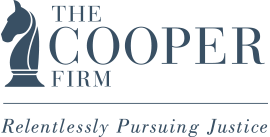About Us
Negligent Entrustment
Did you know that if you allow another person to operate your car, truck, boat, aircraft, or motorcycle, you may be liable if the driver causes harm to another person while behind the wheel? In some situations, Georgia law allows a person injured by a negligent or reckless driver to bring claims against the vehicle owner—even if they weren’t driving.
What Factors Would Make an Owner Liable for a Third-Party Driver?
Even though an owner was not operating the vehicle at the time of the incident, in some situations, they may be legally and financially liable for damages under a claim of negligent entrustment. Basically, this occurs if you negligently allow a driver to operate your motor vehicle despite knowing they are incompetent or unfit to do so safely.
A driver is automatically considered “incompetent” under Georgia law if they do not have a driver’s license that is 1) valid and 2) applicable for the type of motor vehicle they attempt to operate. This means they must have a driver’s license for a car, a pilot’s license for a plane, and an appropriate rating for a motorcycle or commercial vehicle, etc. A person can be “unfit” to operate a car, truck, motorcycle, or other motor vehicle based on their age, lack of experience, physical or mental impairment, or known history of reckless driving.
Negligent Entrustment in Drunk Driving Accident Injuries
Negligent entrustment claims often arise after drunk driving accidents. If the owner of a car or other motor vehicle lets someone they know to be intoxicated operate the vehicle, the owner can be held liable for any injuries or damage the impaired driver causes. Even if the vehicle owner didn’t have actual knowledge that the driver was drunk, they might be liable if they knew the driver had a history of habitually reckless or drunk driving.
Duty of Employers
An employer has a legal duty to ensure their employees are competent and responsible to handle any vehicle or other machinery furnished to them. This includes taking all reasonable steps to ensure they are safe drivers who possess the appropriate, valid operating license for each vehicle.
Employers may be liable for damages caused by their employees based on a few different legal theories. They could be liable under a theory of negligent entrustment if they knew or should have known that an employee was unlicensed, untrained, or uncertified, or had a history of moving violations and reckless driving citations. If the facts do not support such an allegation, an employer could still be held liable if the employee’s negligence caused an accident while the employee was performing his job. This legal theory, called “respondeat superior,” holds an employer liable for the negligence of its employees as its agents.
Elements of Successful Negligent Entrustment Cases
To succeed on a negligent entrustment claim, an individual must prove four elements:
- A person either owned or had control over a vehicle they entrusted to another driver.
- The driver to whom the automobile was entrusted was incompetent, unfit, or incapable of driving the vehicle safely.
- The defendant had actual knowledge that the person to whom they entrusted their vehicle was incompetent, unfit, or incapable of safely driving the vehicle.
- The incompetent driver proximately caused the collision in which the plaintiff was injured or their family member was killed.
The facts of each case are different, and many successful lawsuits hinge on conducting a thorough investigation and expert analysis. An experienced personal injury attorney can help you develop your case fully and recover fair compensation for your damages.
Contact an Experienced Georgia Personal Injury Attorney
The Cooper Firm has extensive experience handling cases involving negligent entrustment of a vehicle and pursuing claims against all responsible parties. If you’ve been injured in a motor vehicle accident where the driver was not the vehicle owner, contact our attorneys for a free evaluation. We can help you understand your options so you recover the maximum amount of compensation for your injuries.


